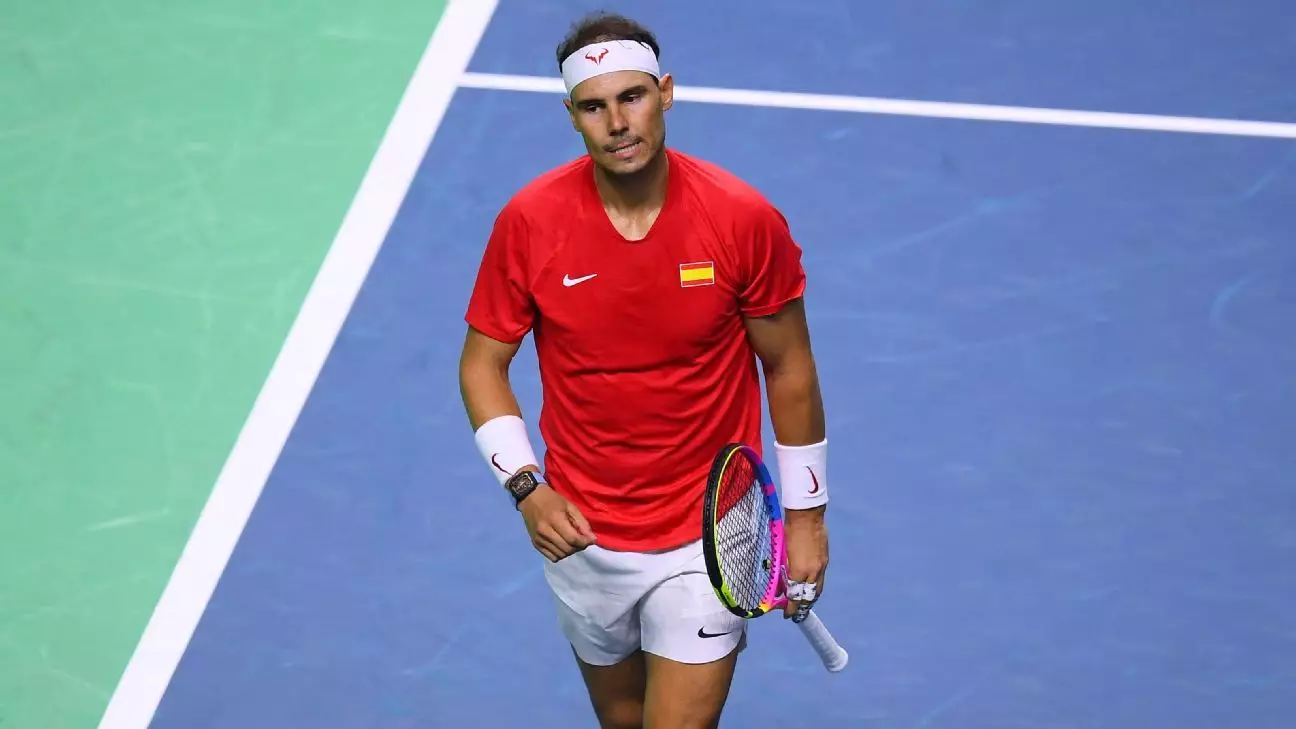In the vibrant city of Málaga, Spain, the echoes of a remarkable sporting career reverberated through a Davis Cup quarterfinal match. On a day that was emblematic of both triumph and potential farewell, Rafael Nadal faced off against Botic Van De Zandschulp. The match concluded with a 6-4, 6-4 defeat for Nadal, a bitter pill for a player who has long been associated with resilience and greatness on the court. His subsequent reflections were steeped in an essence of humility and introspection, as he grappled with the reality of his impending retirement.
Nadal’s admission of self-doubt signals a poignant moment in his illustrious career. He openly acknowledged his struggles on the court and expressed that, based on his performance, he wouldn’t select himself for the next match. This newfound humility is a far cry from the unwavering confidence that characterized his past victories. The moment he conceded, “if I would be the captain, probably I will change,” stands as a testament not only to his respect for the team dynamics but also to the brutal honesty that often accompanies the sunset of a sports journey.
Nadal’s remarks also shed light on the critical role of team leadership—specifically his relationship with Spain’s captain, David Ferrer. For a tennis player who has spent countless hours on the court honing his craft, the acknowledgment of Ferrer’s authority reveals a deeper understanding of teamwork. This dynamic is vital, particularly in the context of high-stakes situations like the Davis Cup, where every decision can impact the path forward.
What is striking, however, is how Nadal articulated his lack of pressure on Ferrer regarding his selection. His comment, “I put no pressure on Ferrer to pick me,” encapsulates a maturity that transcends mere sportsmanship. It reflects a grounded awareness that what matters most is the collective goal of the team. This mindset is crucial for enabling cohesion and mutual support, attributes that become even more significant when a team is facing elimination.
The emotional landscape of that day was palpable. For Nadal, who had stepped onto the court for what could potentially be his last singles match, the weight of finality infused the atmosphere. He articulated the mix of pride and melancholy he felt while hearing the Spanish national anthem, marking it as a “very special” moment. The farewell sentiments are not only a reflection of his loyalty to his nation but also a testament to the hard-fought battles that have defined his identity.
As he navigated through his introspections, it became clear that Nadal was performing not just as an athlete but as a symbol of perseverance. His struggle to maintain positivity, despite the outcome, was a poignant reminder that even champions experience setbacks. In his closing thoughts on the match, he notably extended congratulations to Van De Zandschulp, showcasing respect and humility rather than dwelling on his own disappointments.
Looking to the future, Nadal expressed an unyielding hope for Spain’s success in the tournament. His determination to keep fighting for his team, despite feeling unfit for play, evokes a sense of loyalty that is reminiscent of his many epic battles on the court. He articulated a desire to support younger players, like Carlos Alcaraz, emphasizing the importance of teamwork and the collective effort required to advance.
As the tournament progresses, Nadal’s journey illustrates an athlete embracing the complexities of farewell. His reflections transcend the physical competition, focusing instead on legacy, teamwork, and the emotional undercurrents that accompany the end of an era. In a sport where victory is often measured in numbers, Nadal’s experience in Málaga serves as a reminder of the deeper connections forged through shared hardships and accolades.
Rafael Nadal’s performance in Málaga and his subsequent reflections highlight a multifaceted narrative of triumph, self-awareness, and hope. As he stands at the precipice of retirement, his story is not just one of wins and losses but of enduring spirit and camaraderie—a story that will resonate long after he hung up his racquet for the final time.


Leave a Reply